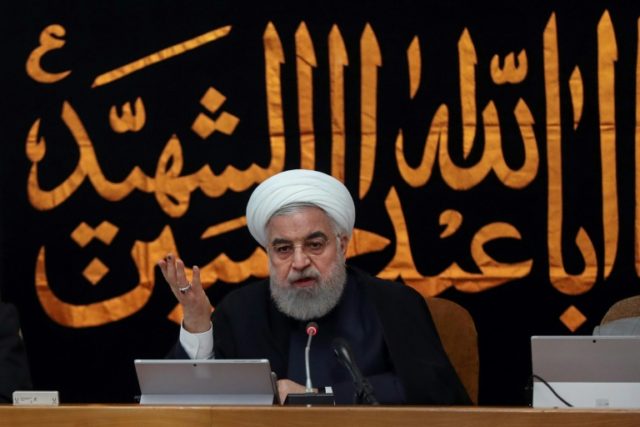Tehran (AFP) – President Hassan Rouhani said Iran will announce a new step in scaling back its nuclear commitments by Thursday as it seeks sanctions relief from the United States, which responded by imposing even more restrictions.
Iran and three European countries — Britain, France and Germany — have been engaged in talks to reduce tensions and save a 2015 nuclear deal that has been unravelling since US President Donald Trump withdrew from it in May last year.
The efforts have been led by French President Emmanuel Macron, who has been trying to persuade the US to offer Iran some sort of relief from crippling sanctions it has reimposed on the Islamic republic since its pullout.
“I don’t think that… we will reach a deal so we’ll take the third step and we will announce the details today or tomorrow,” Rouhani told a cabinet meeting on Wednesday.
The Iranian president said the two sides were getting closer to an agreement on a way to resolve burning issues.
“If we had 20 issues of disagreement with the Europeans in the past, today there are three issues,” he said.
“Most of them have been resolved but we haven’t reached a final agreement.”
Macron, meeting Trump last month in France, encouraged him to offer economic incentives for Tehran and dangled the possibility of a summit between the US and Iranian presidents.
Trump — who made a splash last year with a summit with North Korea — made clear Wednesday that he was still interested in meeting Rouhani when the Iranian leader visits New York for the annual United Nations General Assembly.
“Sure, anything is possible,” Trump told reporters.
– US firm on sanctions –
But Rouhani has already ruled out a summit without sanctions relief, and on Wednesday the Trump administration issued its third set of sanctions on Iran in less than a week.
In the latest salvo, the Treasury Department put on its blacklist a shipping network of 16 entities, 10 people and 11 vessels that it said was selling oil on behalf of Iran’s elite Revolutionary Guards’ Qods Force.
The network sold more than $500 million worth of oil this spring, mostly to Syria, benefitting both President Bashar al-Assad and militant Lebanese allies Hezbollah, the Treasury Department said.
A US official said that the move showed Washington’s position on relaxing sanctions — and warned that more would come.
“We can’t make it any more clear that we are committed to this campaign of maximum pressure and we are not looking to grant any exceptions or waivers,” Brian Hook, the State Department coordinator on Iran, told reporters.
Iran has said it will resume full compliance with the nuclear deal if it reaches a deal with France on a $15 billion credit line, which Tehran would repay once it resumes oil exports — which the United States is trying to block with unilateral sanctions.
Speaking days after a trip to France, deputy foreign minister Abbas Araghchi ruled out renegotiation of the 2015 accord, known as the Joint Comprehensive Plan of Action (JCPOA), which was agreed between Iran and UN Security Council permanent members Britain, China, France, Russia and the United States plus Germany.
“Returning to full implementation of the JCPOA is subject to receiving $15 billion over a period of four months, otherwise the process of Iran reducing its commitments will continue,” said Araghchi, as quoted by the state news agency IRNA.
Hook stopped short of criticising the credit line itself, saying there was no “concrete” proposal.
Hawks in the Trump administration adamantly oppose any easing of pressure, saying their goal is not only to contain Iran’s nuclear programme but to curb the clerical state’s influence across the Middle East.
– Latest countermeasures –
Iran has long threatened to carry out a third set of nuclear countermeasures by Friday unless other parties to the deal offset the effect of US sanctions in return for its continued compliance.
On July 1, Iran said it had increased its stockpile of enriched uranium to beyond the 300-kilogram maximum set by the deal.
A week later, it announced it had exceeded a 3.67-percent cap on the purity of its uranium stocks.
The UN’s nuclear watchdog, the International Atomic Energy Agency, said on August 30 that Iran’s uranium stockpile stood at about 360 kilograms and that just over 10 percent of it was enriched to 4.5 percent — still well below the level needed for nuclear weapons.
Rouhani gave little away on Wednesday about what Iran’s next step might be, only saying it “may not seem very shocking but… it is extremely important”.
“This step is the most important step we have taken and its effects will be great and, God willing, with this step (Iran’s) Atomic Energy Organisation will accelerate processes,” he said.

COMMENTS
Please let us know if you're having issues with commenting.